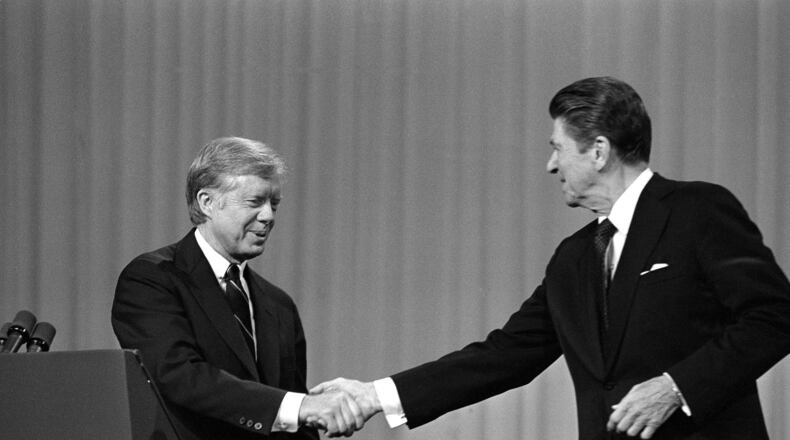There’s every reason to expect similar, if not higher, ratings this year. That’s because of the candidates — Trump always draws a crowd, and voters may want to see how Biden holds up against him — and the issues — a global pandemic, a weakened economy and a national reckoning on racial justice.
The bigger, and more difficult, question is: Will the debates matter? Of course, many of us know the key moments from past debates that supposedly decided a presidential election —John Kennedy wooing voters through their television screens in 1960, Ronald Reagan asking if we were better off after four years of Jimmy Carter’s presidency in 1980, and Al Gore sighing away his lead in the polls in 2000.
Credit: Larry Burgess
Credit: Larry Burgess
The problem is, those pivotal moments weren’t pivotal, after all. In fact, political science research shows that presidential debates rarely, if ever, decide a presidential election. Most people have their minds up about the presidential race by the time the debates roll around. The reason they watch, then, is not to decide who to vote for, but to cheer on their team. As political scientist Jody Baumgartner puts it: “Rather than swaying voters' minds, presidential debates tend to reinforce voters' preexisting views.”
It’s true, you may see a post-debate bump (or dip) for one of the candidates. But that doesn’t mean voters are changing their minds, necessarily. For example, after then-President Barack Obama’s faceplant in the first debate of 2012 — which even Democrats conceded he had “lost” — Republican challenger Mitt Romney seemed to close the gap in national polls. But a later analysis by political scientists John Sides and Lynn Vavreck showed that Romney had not actually won over Obama voters; rather, these gains mostly represented wavering Republicans “coming home” to support Romney, as they probably would have done eventually, anyway.
In the same way, Trump, for example, might gain in the polls following a better than expected debate performance against Biden. But if so, will this be because he has persuaded independents or Democrats to support him? Or because wavering Republicans — perhaps alienated by Trump’s pandemic response or personal conduct — seize on this excuse to return to the party fold?
By all means, watch the debate on Tuesday. I’ll be joining you. But, like me, you shouldn’t expect it to decide the 2020 election.
Christopher J. Devine is an assistant professor of political science at the University of Dayton.
About the Author
